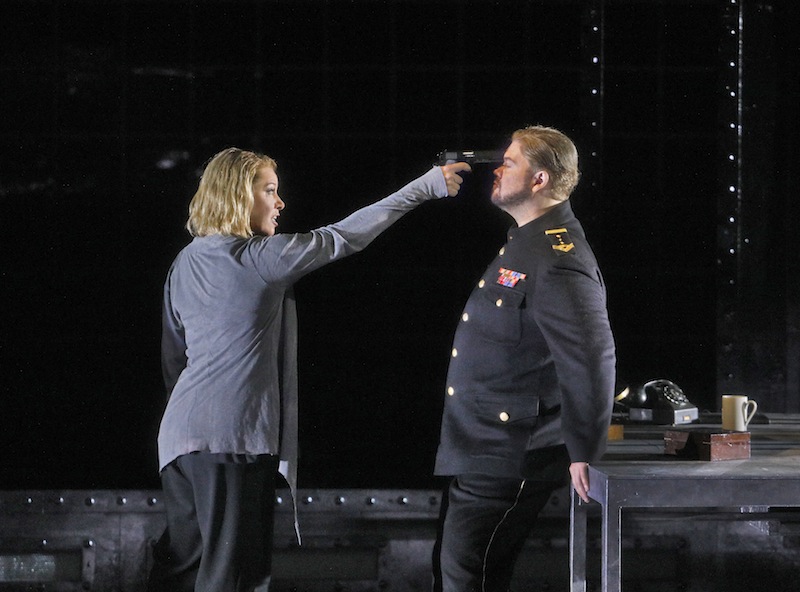Met opens season with a dark yet musically triumphant “Tristan”

Nina Stemme and Stuart Skelton in Wagner’s “Tristan und Isolde,” which opened the Metropolitan Opera season Monday night. Photo: Ken Howard
A Tristan und Isolde that takes cues from Das Boot might seem unlikely to find much dramatic success. The audience that took in the Metropolitan Opera’s opening night performance on Monday certainly found it so, greeting the production team with some of the most vicious jeering to be heard at the house in recent seasons.
Indeed, the new production by Mariusz Treliński, hero of the 2015 Bluebeard’s Castle, felt lost in many particulars. The director transports Wagner’s drama to a contemporary warship, changing the setting with little explanation, but inserting a dose of arson-suicide to fill out Tristan’s backstory. A SONAR scope that dissolves into images of a destroyer on rough seas firmly establishes the initial scenario, but soon becomes a tired visual motif. A little boy who visits the wounded Tristan’s bedside, ostensibly representing the hero’s younger self, teeters precariously on the edge of cliché. And just about the only lights to be seen on stage are the ones shined directly into the viewers’ eyes at moments of dramatic significance.
For the most part, though, Treliński’s take hews close to the story and delves deep into the text’s darker side. A pantomime flashback during Isolde’s narrative in Act One establishes the tone clearly: her late husband Morold, blindfolded and bound to a steel chair after an interrogation, is executed in cold blood by Tristan, in this conceit a young and ambitious naval officer. At first the violence with which the characters treat each other, and the stony-faced acceptance of all this cruelty, might seems aggressively postmodern; yet in fact it is a perfectly fair reflection truthful to the original medieval scenario—these are hard characters inhabiting a hard world.
Into the blackness steps Nina Stemme, the headliner among an extraordinary cast. On her own terms, Stemme’s was not the most impressive voice in Monday’s lineup. Only in a handful of moments, such as her duet with Tristan in Act II, did she really warm to the part; Simon Rattle and the Met Orchestra stole the Liebestod right out from under her. Her greatest gift is for characterization, both vocal and dramatic: even though she may not have sounded as lovely as some other Isoldes, in the hardness of her singing a listener could hear the immense grief that has shaped her character. The life-or-death stakes of the potion scene in Act I gave her “reconciliation” with Tristan a brilliant tension, and even in moments of rapturous love she seemed keenly aware that joy could not possibly endure.
In truth, there were two stars in Monday night’s performance. The first was Stuart Skelton, who gave a compelling portrayal of Tristan as a dutiful soldier wrestling with his ghosts. So often with Wagnerian tenors, we have to settle: a heldentenor who can simply sing all the notes seems to be the best we can reasonably expect; one who can can sing with real feeling and beautiful tone, and deliver a compelling dramatic portrayal to boot is almost a myth. Skelton was superb on both counts, however, producing lovely, dark-hued tone all evening, and grappling visibly with his character’s complex emotions. His desperate monologue in Act III was so riveting, it was easy to forgive a little vocal fatigue.
The other was the Metropolitan Opera Orchestra, under the sure hand of Sir Simon Rattle. The orchestra that Levine built remains perfectly suited to Wagner, capable of a vast range of colors and textures, swelling power and hushed stillness. At first it seemed as though Rattle’s deliberate pacing might be a persistent drag on the performance, but in the end he turned in a reading of tremendous energy while losing none of his meticulous sonic detail. Of many highlights, Pedro R. Díaz’s plaintive English horn solos stood out for their emotional impact, achieved by the simplest means.
A strong supporting cast rounded out what was, in strictly musical terms, a true opening-night triumph. René Pape still has one of the most magnificent vocal instruments before the public, a generous, rich bass that he shapes into long, breathing phrases. He initially felt shoehorned into the role of King Marke, struggling to command much sympathy as a swaggering Admiralissimo come to demand his promised bride. By evening’s end he had found the heart of the character, overcoming an unfortunate pair of shades (on a nearly pitch-black stage) in a moving lament for his departed friend.
Mezzo-soprano Ekaterina Gubanova was beautifully lyrical in her singing, and did admirable dramatic work in the somewhat thankless role of Brangäne, showing real affection and concern for Isolde. Evgeny Nikitin was similarly affecting as her opposite number, Kurwenal, protesting his devotion to Tristan in a strong, gruff bass-baritone. Two tenors made fine impressions in their debuts: Neal Cooper as Tristan’s rival Melot, here a sneering staff officer, and Alex Richardson, who brought a touch of gold to the shepherd’s (or, rather, hospital guard’s) part in Act III.
A note on Rattle’s judicious editing of the score. The conductor reinstated a cut in the Act II duet that was commonly opened up during the Levine era. The fashion lately has been towards performing all scores absolutely complete, with the result that more and more operas approach a Wagnerian length, whether by Wagner or not. It’s refreshing to see a musician so confident, experienced and knowledgeable as Rattle exercising a little discretion in his preparation.
Tristan und Isolde runs through October 27 at the Metropolitan Opera. Asher Fisch conducts on October 24 and 27. metopera.org